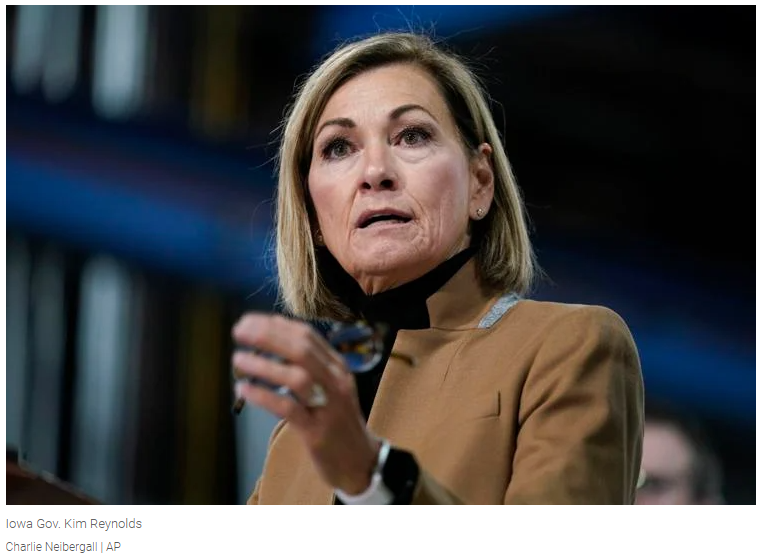|
President Calvin Coolidge regarded “a good budget as among the most noblest monuments of virtue.” Government spending is at the heart of sound public policy. President Coolidge understood the importance of economy in government in order to achieve sound public policy. President Coolidge’s fiscal conservatism is being exemplified at the state level by Iowa Gov. Kim Reynolds, who is making fiscal conservatism a priority resulting in benefits to Iowans. Gov. Reynolds, just as with Coolidge, understands that prudent budgeting is a virtue.
Despite the national economic malaise from high inflation and stagnant growth, Iowa’s fiscal foundation was strong heading into the 2023 legislative session. Last year, Gov. Reynolds and the Iowa Legislature continued to place a priority on prudent budgeting. The general funds budget for fiscal year 2023 was $8.2 billion, increasing by just 1 percent from the prior year. This session the legislature enacted an $8.5 billion budget for fiscal year 2024, which is a 3.6 percent increase from the previous year’s budget. This holds the budget well below the Conservative Iowa Budget, which set a cap on the budget of $8.8 billion based on the maximum rate of population growth plus inflation of 7.4 percent. In other words, taxpayers benefit from the budget growing well below the growth of the economy, allowing more money in the productive private sector. In January, Gov. Reynolds proposed an $8.48 billion budget, which reflected her priorities including funding the Students First Act, which created a universal Education Savings Account program. After budget negotiations between the House and Senate, the Legislature passed a budget that was a slight increase from the governor’s original proposal. The $8.5 billion budget spends only 88.25 percent of projected tax collections. Since 2018, Gov. Reynolds and the Legislature have placed an emphasis on passing tax reforms and restraining the growth of spending. This approach has left more money in taxpayers’ pockets with a substantial tax relief package headed toward a low flat tax by 2026. What too many people overlook is that significant tax cuts like Iowa’s are only made possible by years of prudent and conservative budgeting. Without spending restraint, any tax relief, regardless of the tax, becomes impossible. The evidence is clear that prudent budgeting is paying off for Iowans. Iowa’s budget continues to be in surplus. The surplus for fiscal year 2023 is projected to be $1.7 billion and the current estimated surplus for fiscal year 2024 is projected to be $2 billion. In addition, Iowa’s reserve accounts (Cash Reserve Fund and the Economic Emergency Fund) will continue to be funded at their statutory limits with a combined balance of over $961 million. The Taxpayer Relief Fund will also continue to increase. The balance in the Taxpayer Relief Fund for fiscal year 2023 is $2.7 billion and this is estimated to increase to $3.5 billion in fiscal year 2024. Both Gov. Reynolds and legislative leaders have signaled that further income tax reform will be a priority for the 2024 legislative session. The Taxpayer Relief Fund, which was originally created for the purpose of income tax relief, will be instrumental in further income tax rate reductions. Iowa Senate Republicans introduced an income tax reform proposal this past session that if enacted would have sped up the income tax rate cuts and used the Taxpayer Relief Fund to phase-out the income tax altogether. In addition to restraining spending, Gov. Reynolds also made some important reforms that will impact future state spending. One of her major priorities was to reform state government. Gov. Reynold’s state government reform measure consolidates and makes government more efficient. Currently, Iowa has 37 executive branch cabinet agencies – more than all neighboring states. The governor’s proposal will reduce the number of executive-level agencies to 16, streamlining and cutting bloated bureaucracy while saving taxpayer dollars. It is estimated that this plan will save taxpayers over $214 million over four years. This was the first major reform of Iowa’s bureaucracy in nearly 40 years. Further, Reynolds issued an executive order at the beginning of the legislative session that requires an extensive review process of Iowa’s regulatory code. Both reforming Iowa’s bureaucracy and reducing burdensome regulations are essential in the path to sustaining limited spending. In its Fiscal Policy Report Card on America’s Governors 2022, the Cato Institute ranked Gov. Reynolds as the best governor. “Governor Reynolds has been a lean budgeter and dedicated tax reformer since entering into office in 2017,” wrote Chris Edwards and Ilana Blumsack, authors of the report. This year, Gov. Reynolds and the Legislature are continuing this trend. Iowa is at the forefront of conservative budgeting that other states and the federal government should follow. Originally published at The Center Square and co-authored with John Hendrickson at Iowans for Tax Relief Foundation.
0 Comments
Leave a Reply. |
Vance Ginn, Ph.D.
|


 RSS Feed
RSS Feed